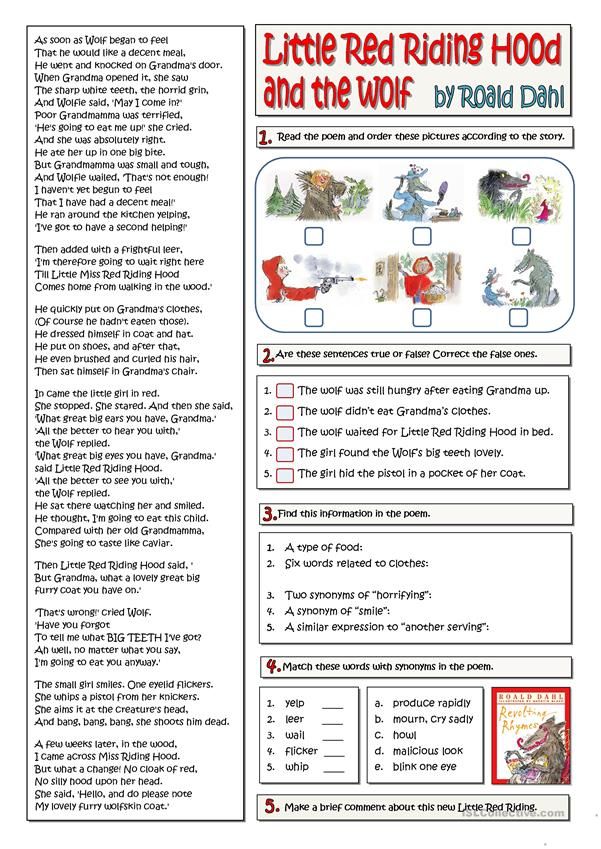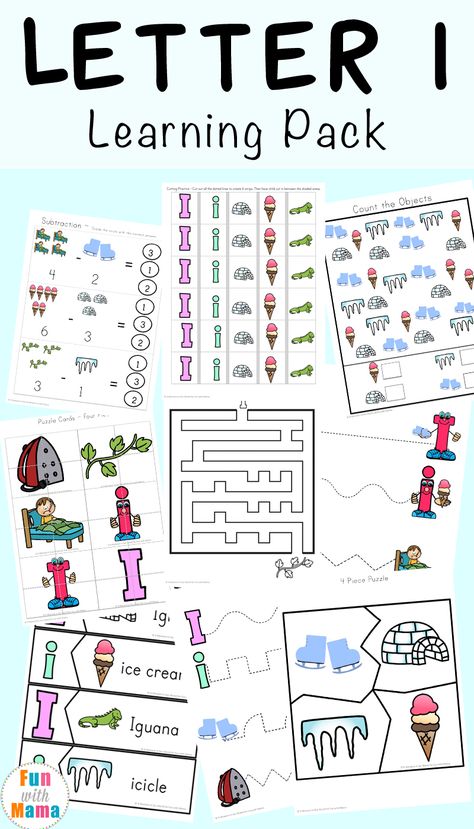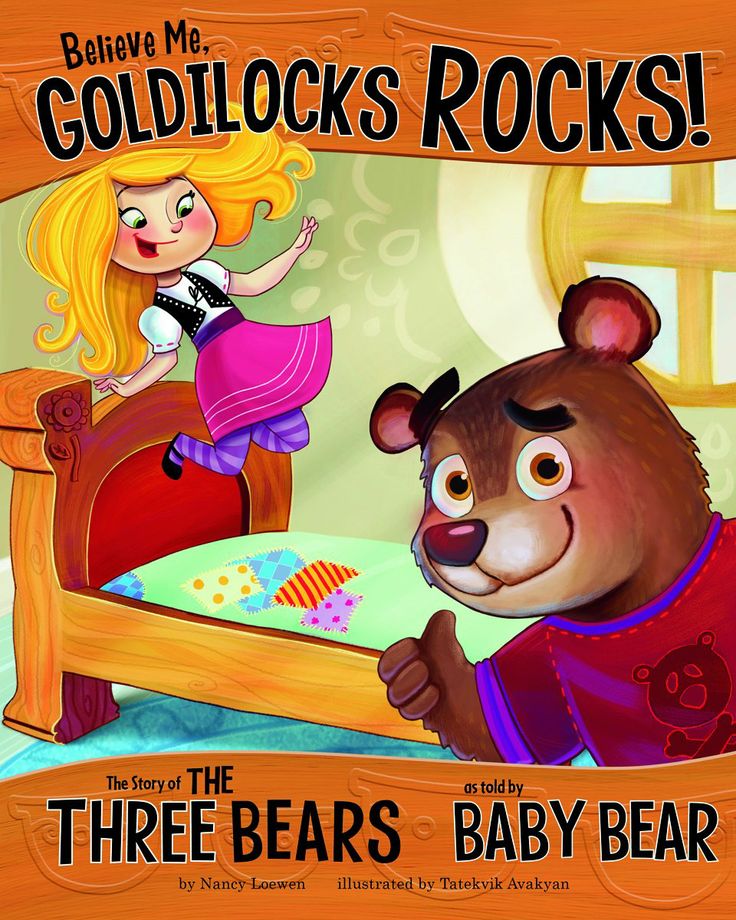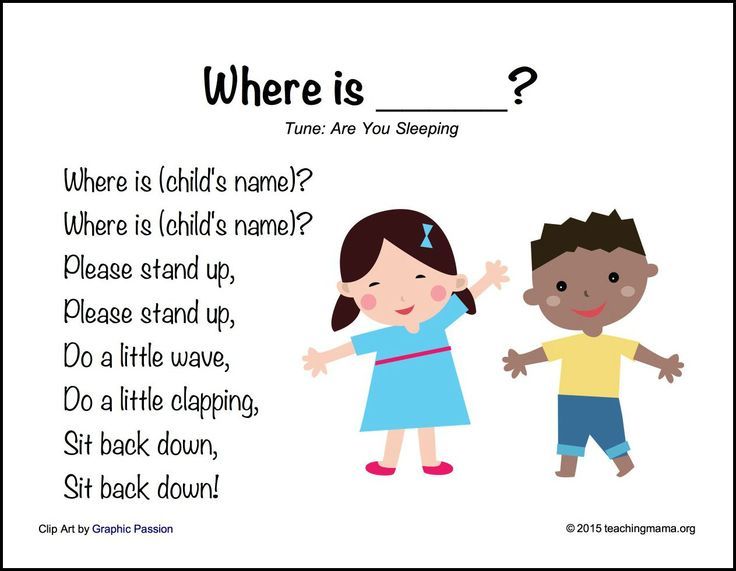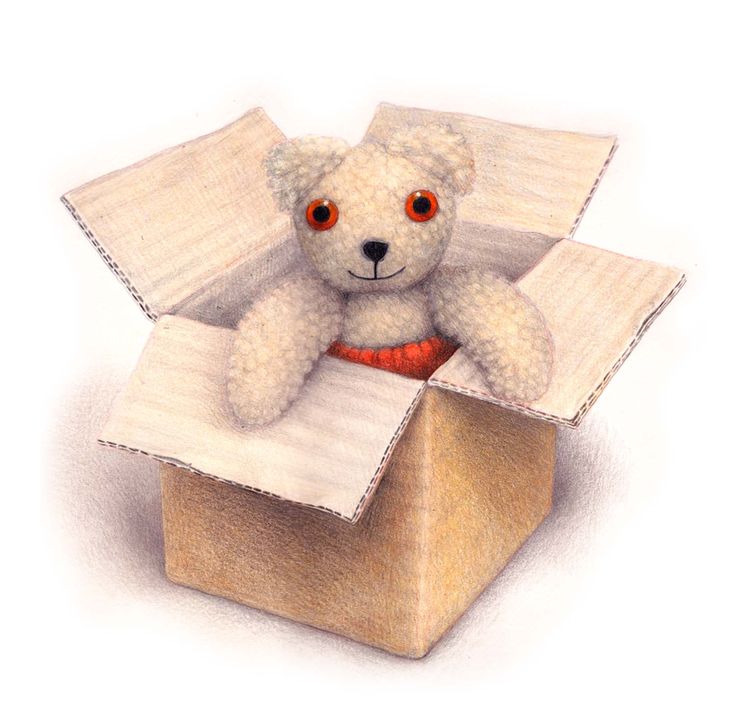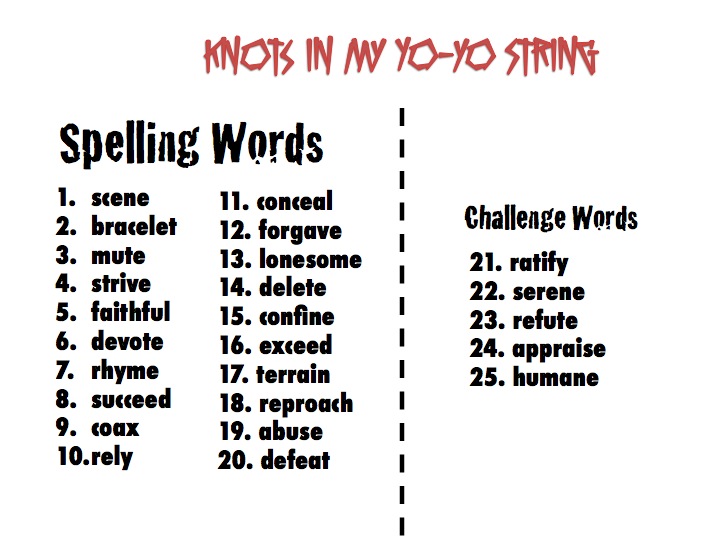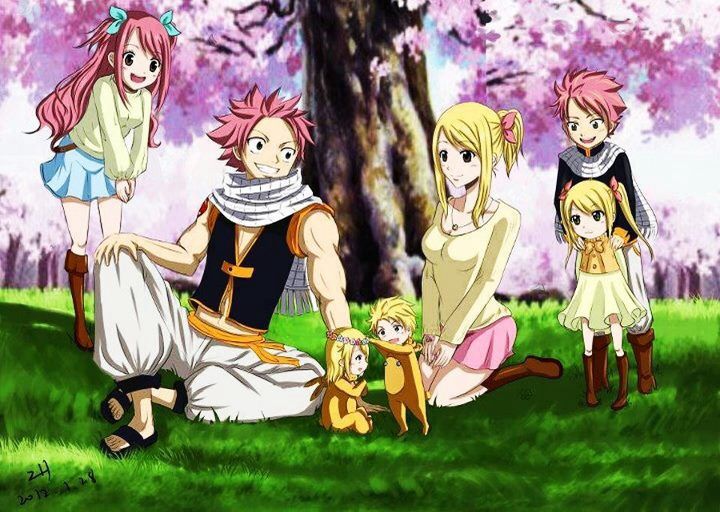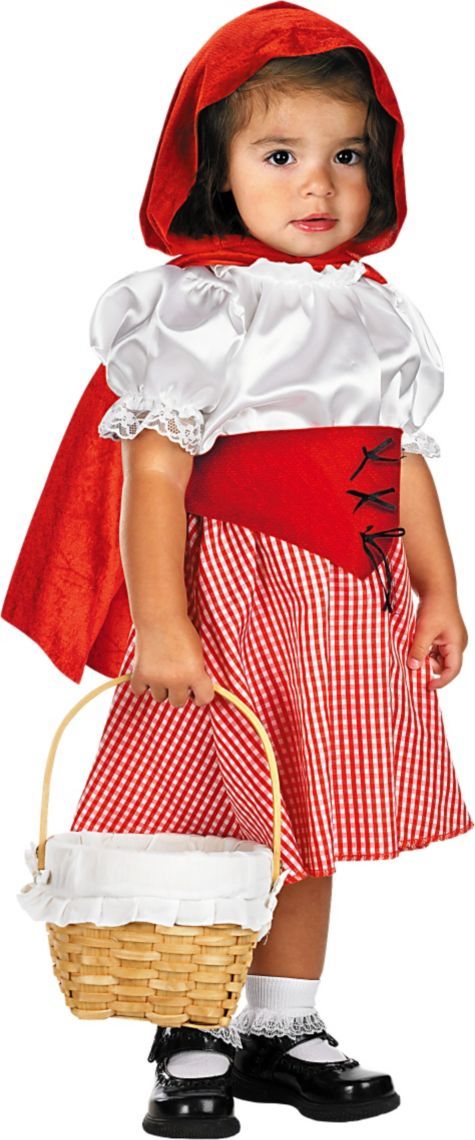Little red riding hood what big ears you have
‘My, what big eyes you have’
The Brothers Grimm were Jacob and Wilhelm, German born in the later 1700’s, and best known for publishing fairy tales, such as Snow White, Cinderella, Hansel and Gretal, Rapunzel, and the Frog Prince.
The Brothers Grimm are sometimes criticized for being, well, grim.
See, children suffer in these fairy tales at the hands of cruel parents and witches and sometimes the teeth of wild animals. Sometimes the children are rescued by fairy godmothers and other assorted providence. Sometimes they escape to freedom by their own wits and resourcefulness. Other times they don’t. Sometimes they die.
Just like in real life. Which is why I dig the Brothers Grimm. Classic fairy tales are so human. So real. And they do more than entertain. Classic fairy tales teach us, young and old alike. They ask us to look at ourselves and our culture.
Which brings me to Little Red Riding Hood. You remember …
Girl wearing a red cloak walks through the forest alone on the way to visit her sick grandmother. She meets a wolf that is hesitant to eat her in public. Decorum, don’t you know. The wolf suggests Red tarry to pick flowers for the visit, and takes advantage of the delay to get to gramma’s house first.
Wolf eats gramma. And then dons her nightgown and cap. Crawls into gramma’s bed. And waits.
You know the drill. Little Red Riding Hood arrives, stares at this wolf wearing nightclothes and all she can think of to say is, “My, what big eyes you have!” And the wolf says, “All the better to see you with.” To which Red says, “What big ears you have!” You guessed it, “All the better to hear you with.”
Then the teeth. Red notices aloud that gramma has really big sharp teeth, to which the wolf replies, “All the better to EAT you with.” And so he does. Eats her. In the original tale, nobody comes to save Little Red Riding Hood. She gets eaten.
And she deserves to get eaten.
The classic ‘take’ on Little Red Riding Hood is as a morality play about the dangers of naiveté. But, I suggest that Little Red Riding Hood’s problems are far worse than that. Here’s the deeper question: Hey Red! What is it in you that keeps overriding your own senses! Keeps overriding your own experience.
But, I suggest that Little Red Riding Hood’s problems are far worse than that. Here’s the deeper question: Hey Red! What is it in you that keeps overriding your own senses! Keeps overriding your own experience.
It ain’t your grandmother! Run!
I’m thinking of buying several copies of Little Red Riding Hood, so I can have them on hand to give to patients in therapy. Especially female patients. I can’t explain why, but most therapists (including myself) will tell you they encounter a higher number of women than men who consistently don’t and won’t believe their own eyes, their own ears, and their own felt experience, especially as it regards love relationships with wolves. Er, some men.
I once knew a woman who walked into her own master bedroom to find, in her marital bed, her husband and another woman. Naked. And, two months later, she was still mulling the veracity of the husband’s story that they didn’t have sex and that, while it was “probably inappropriate,” well, he was just trying to comfort the woman who’d had a bad time recently.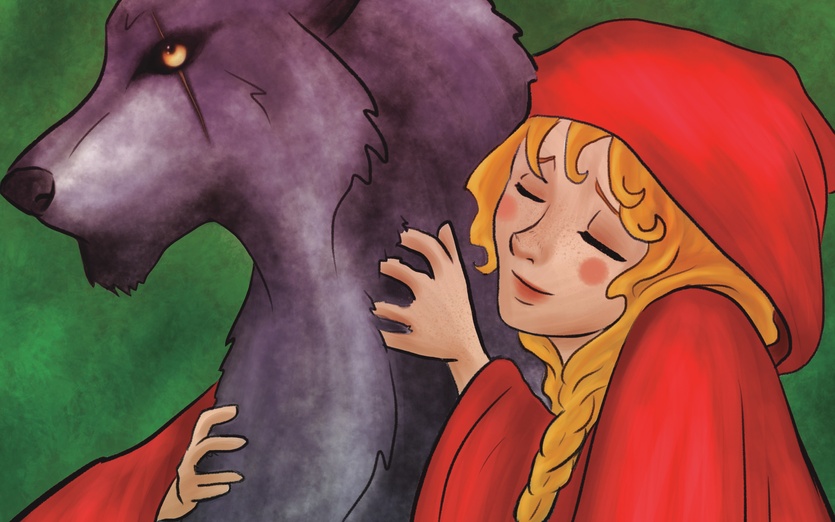
A part of the Little Red Riding Hood Syndrome in men and women actually speaks highly of us. Lots of times the phenomenon is fueled by our own inherent goodness. We like giving people the benefit of the doubt. We like extending good faith to people, especially the ones who have pledged to love us and whom we love in return. We value forgiveness. And, when firmly grounded in self-respect and a radical commitment to reality at all cost, these attributes ARE good things.
But sometimes we clutch and grab at these virtues rather than wield them from a place of strength. I’m saying that a part of why we might override obvious reality is because our own virtues have turned against us.
Pride is another part. We don’t want to believe that we have chosen badly. We don’t want to believe that our beloved is shallow, mean, insensitive, or capable of calculated betrayal. It’s embarrassing to extend your heart to someone, then too late discover that this someone is not who they seemed to be.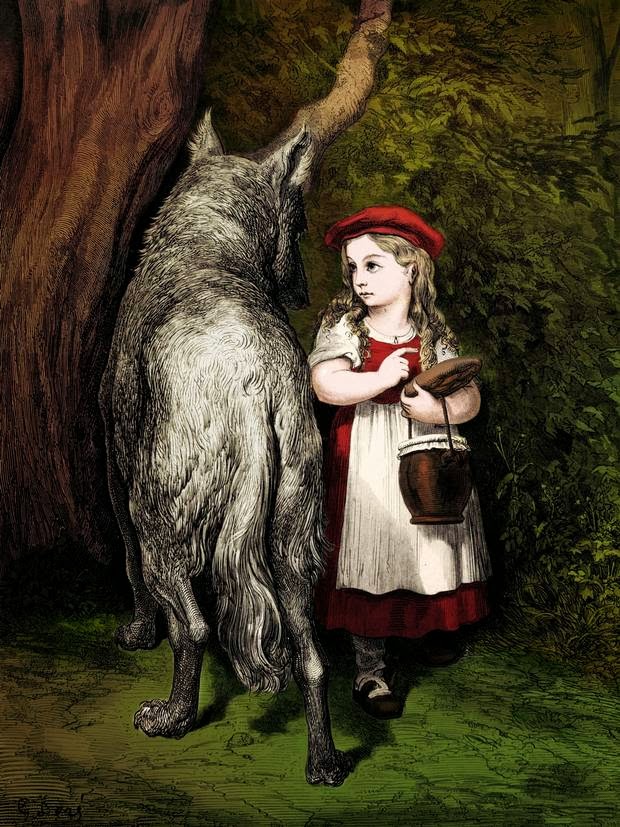 And, if it serves them, they will discard you. Disdain you. Or even gobble you up.
And, if it serves them, they will discard you. Disdain you. Or even gobble you up.
But what Little Red Riding Hood lacks the most is faith in herself and sufficient self-respect to act on that faith. And I don’t think these things can be taught. They must instead be risked. Or not.
It’s not gramma. It’s a wolf.
“When people show you who they really are, believe them.” (Maya Angelou.)
(Steven Kalas is a therapist, author and Episcopal priest. You can reach him at [email protected])
Post Views: 10,293
The Brothers Grimm, "Little Red Riding Hood" (1812)
Home Literary Criticism Children's Literature Characteristics Innocence The Brothers Grimm, "Little Red Riding Hood" (1812)
Characteristics
- Intro
- Top 10 List
- Million Dollar Questions
- Characteristics
- Repetition
- Didacticism
- Illustration
- Optimism
- Fantastic
- Children
- Innocence
- The Brothers Grimm, "Little Red Riding Hood" (1812)
- Margret Rey and H.
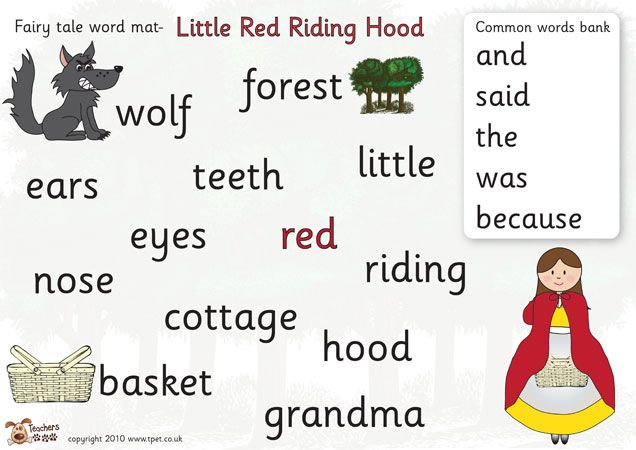 A. Rey, Curious George (1941)
A. Rey, Curious George (1941) - Action
- Children's Rights Movement
- Concept of Childhood
- Top Authors
- Timeline
- Texts
- Best of the Web
- Quizzes
- BACK
- NEXT
She was surprised to find the cottage-door standing open, and when she went into the room, she had such a strange feeling that she said to herself: "Oh dear! how uneasy I feel today, and at other times I like being with grandmother so much." She called out: "Good morning," but received no answer; so she went to the bed and drew back the curtains. There lay her grandmother with her cap pulled far over her face, and looking very strange.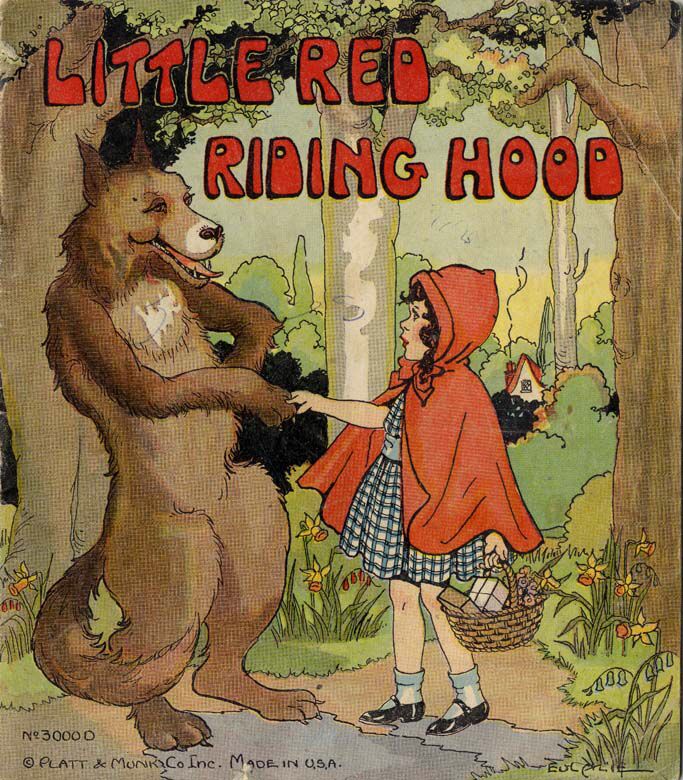
"Oh! grandmother," she said, "what big ears you have!"
"All the better to hear you with, my child," was the reply.
"But, grandmother, what big eyes you have!" she said.
"All the better to see you with, my dear."
"But, grandmother, what large hands you have!"
"All the better to hug you with."
"Oh! but, grandmother, what a terrible big mouth you have!"
"All the better to eat you with!"
And scarcely had the wolf said this, than with one bound he was out of bed and swallowed up Red Riding Hood.
In this excerpt, Little Red Riding Hood doesn't realize that the wolf isn't actually her grandmother. He's just pretending to be…so he can eat her.
Picture this: your grandmother suddenly grows gigantic ears, eyes, and teeth. You'd get a little suspicious, right? But Little Red Riding Hood just stands there and comments on the changes, instead of, you know, running away screaming.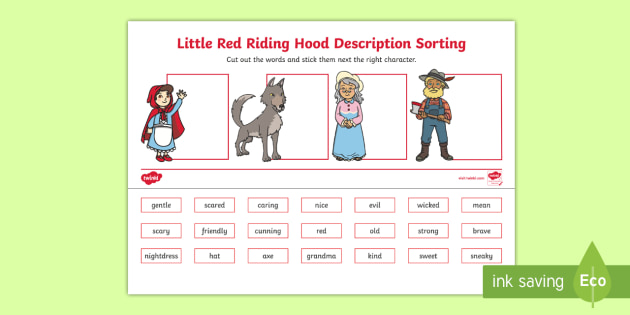
That's innocence at its best—er…worst?
Notice the repetition? We can see a lot of repetition in this passage. Repetition, remember, is one of the structuring elements in children's literature. It helps us remember, which is why, to this day, we all remember the line "all the better to eat you with!"
- BACK
- NEXT
Cite This Page
| Charles Perrault Once upon a time there was a little girl. Her mother loved her without memory, and her grandmother even more. For her granddaughter's birthday, her grandmother gave her a red cap. Since then, the girl went everywhere in it. Neighbors said the same about her: — Here comes Little Red Riding Hood! Once a mother baked a pie and said to her daughter: — Go, Little Red Riding Hood, to your grandmother, bring her a pie and a pot of butter and find out if she is healthy. Little Red Riding Hood got ready and went to her grandmother. She is walking through the forest, and towards her is a gray wolf. — Where are you going. Red Riding Hood? Wolf asks. — I go to my grandmother and bring her a pie and a pot of butter. — Does your grandmother live far away? “Far away,” answers Little Red Riding Hood. - Over there in that village, behind the mill, in the first house from the edge. — All right, — Wolf says, — I also want to visit your grandmother. I'll go down this road, and you go down that one. Let's see which one of us comes first. Wolf said this and ran as fast as he could along the shortest path. And Little Red Riding Hood went along the longest road. She walked slowly, stopping along the way, picking flowers and collecting them in bouquets. Before she had even reached the mill, the Wolf had already galloped up to her grandmother's house and was knocking on the door: Who is there? Grandma asks. - It's me, your granddaughter, Little Red Riding Hood, - the Wolf answers, - I came to visit you, I brought a pie and a pot of butter. Grandmother was sick at the time and was in bed. She thought it was really Little Red Riding Hood and called out: — Pull the string, my child, and the door will open! The wolf pulled the string and the door opened. The wolf rushed at the grandmother and swallowed her at once. He was very hungry because he had not eaten anything for three days. Then he closed the door, lay down on his grandmother's bed and began to wait for Little Red Riding Hood. Soon she came and knocked: - Who's there? Wolf asks. And his voice is rough, hoarse. Little Red Riding Hood was frightened, but then she thought that her grandmother was hoarse from a cold, and answered: — It's me, your granddaughter. I brought you a pie and a pot of butter! The wolf cleared his throat and said more subtly: — Pull the string, my child, the door will open. Little Red Riding Hood pulled the rope-door and opened it. The girl entered the house, and the Wolf hid under the covers and said: - Granddaughter, put the pie on the table, put the pot on the shelf, and lie down next to me! Little Red Riding Hood lay down next to the Wolf and asked: — Grandma, why do you have such big hands? - This is to hug you tighter, my child. — Grandma, why do you have such big ears? — To hear better, my child. — Grandmother, why do you have such big eyes? — To see better, my child. — Grandma, why do you have such big teeth? — And this is to eat you faster, my child! Before Little Red Riding Hood had time to gasp, the Wolf rushed at her and swallowed her. But, fortunately, at that time, woodcutters with axes on their shoulders were passing by the house. They heard a noise, ran into the house and killed the Wolf. And then they cut open his belly, and Little Red Riding Hood came out, and behind her and grandmother - both whole and unharmed. |

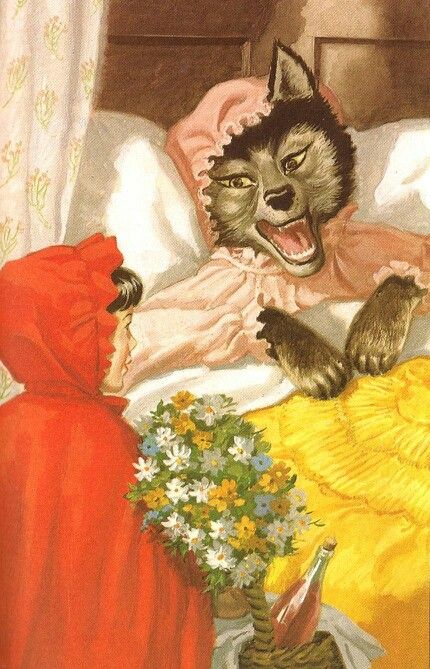
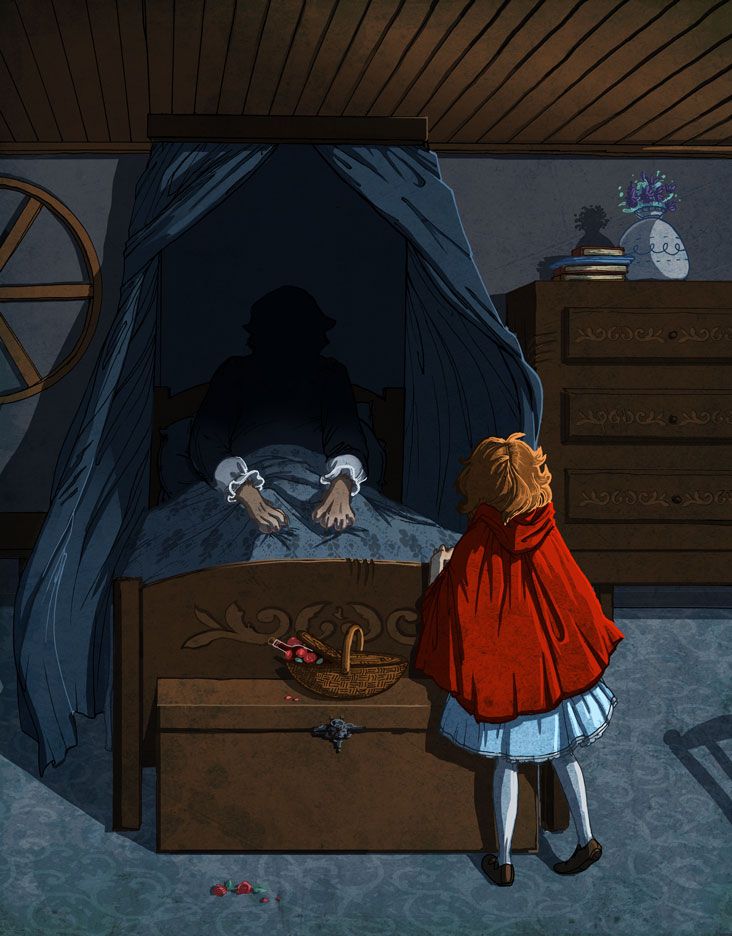
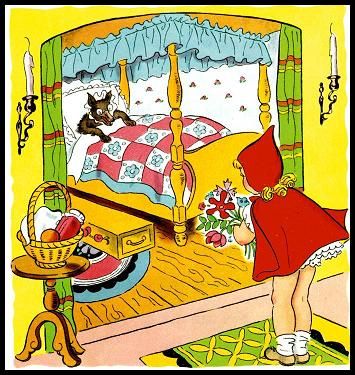

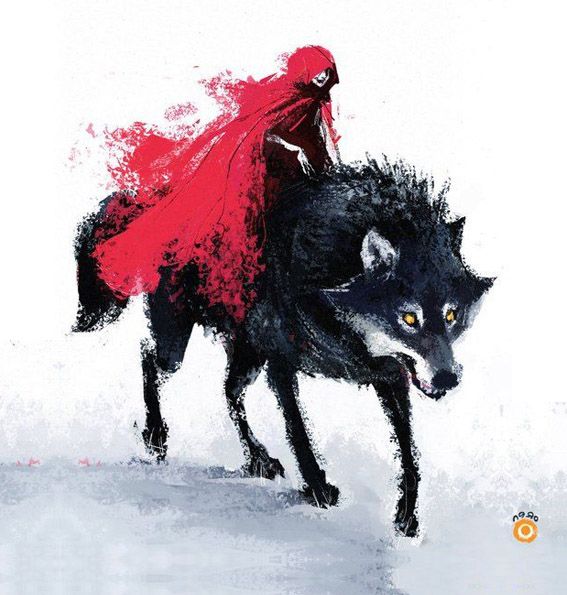 How rough your voice has become, grandma…
How rough your voice has become, grandma…  )
) 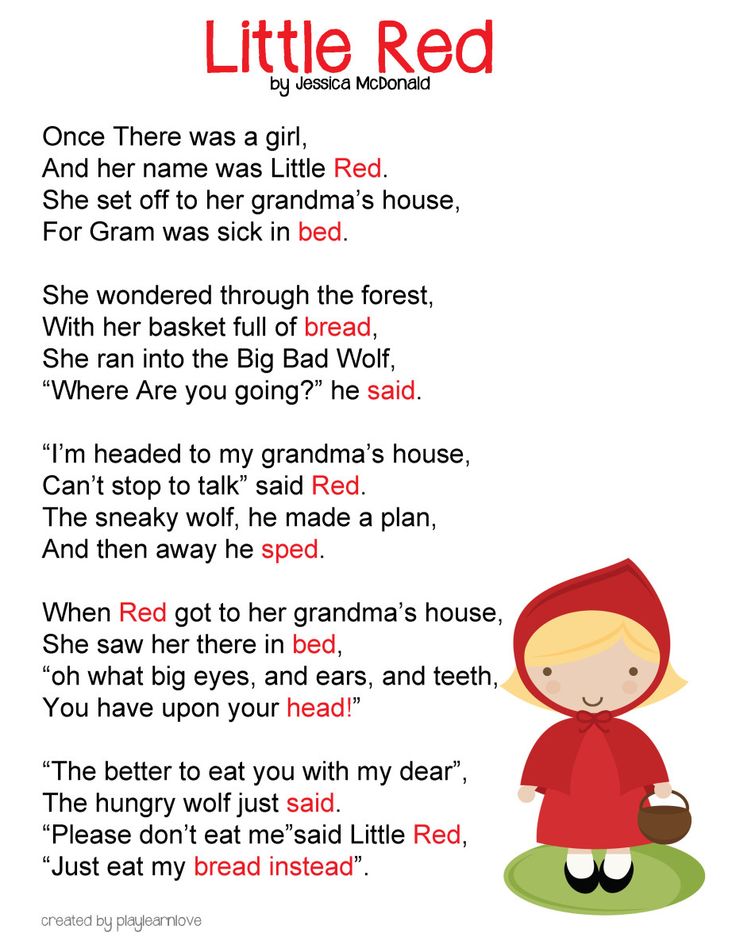 And he began to snore that there is urine.
And he began to snore that there is urine. 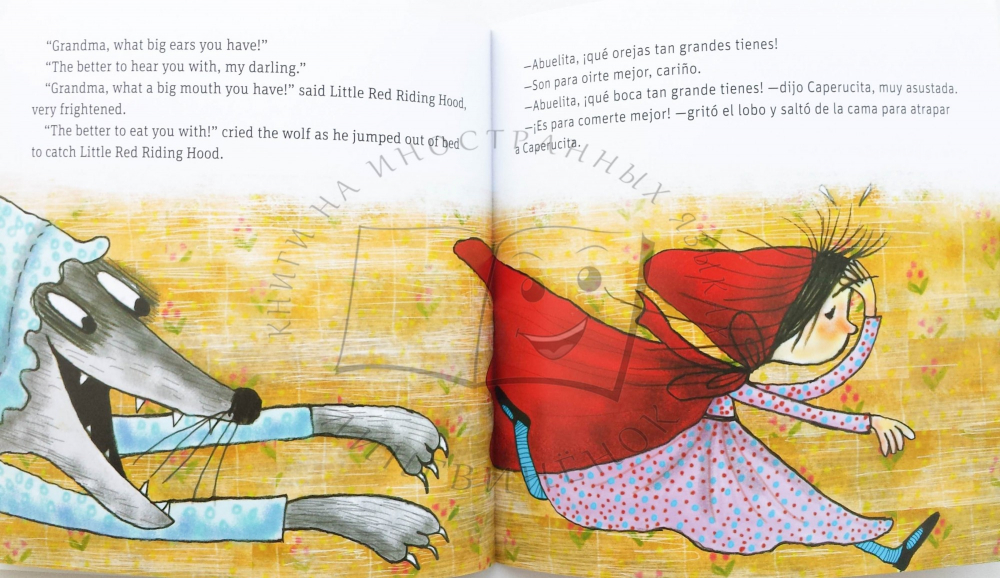
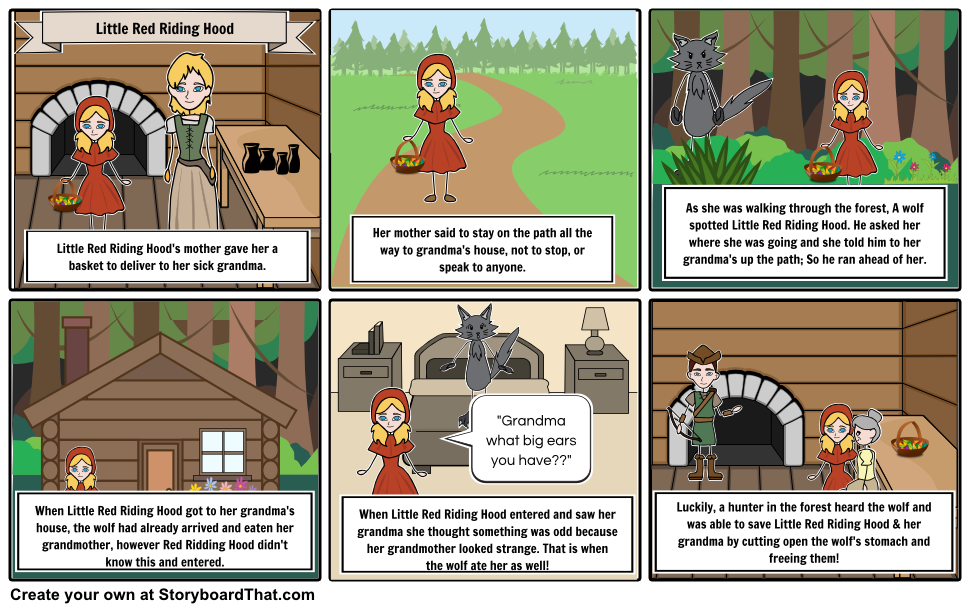 )
) 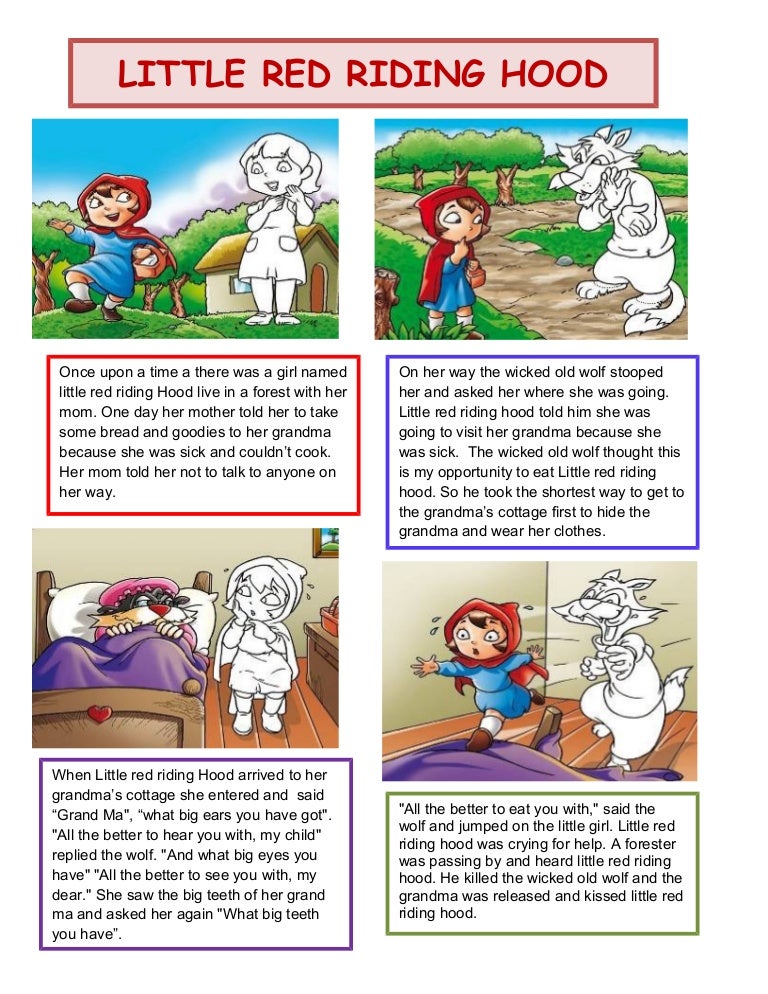
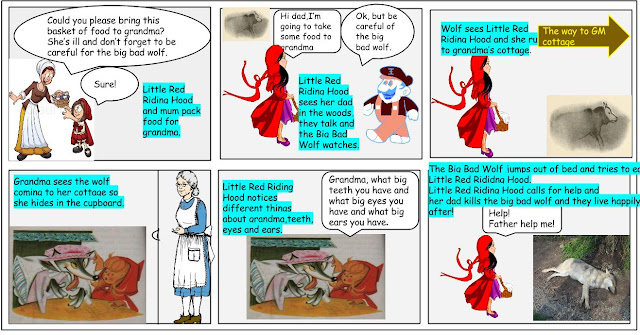 Hmm! Deceiver!
Hmm! Deceiver! 